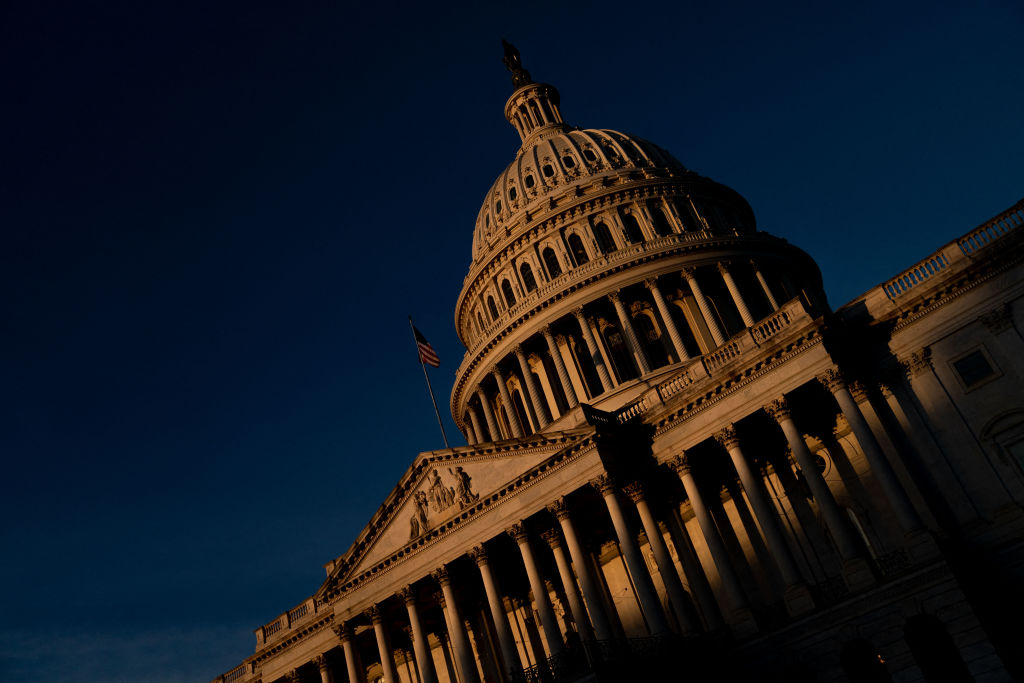How long can the US avoid a government shutdown?
The latest deal moves the fight to January


A free daily email with the biggest news stories of the day – and the best features from TheWeek.com
You are now subscribed
Your newsletter sign-up was successful
Congress has averted a government shutdown. Again. But for how long? That's the question facing lawmakers as the year winds down. The Wall Street Journal reported this week's deal has deferred the perpetual brinkmanship for the moment, "but it could be back with a vengeance soon." The deal kicks the can down the road into the new year, but conservatives in the Capitol are still standing firm "on hot-button issues such as abortion and immigration in talks over full-year funding."
"We expect that fight when we get back" from Thanksgiving break, hardline Rep. Chip Roy (R-Texas) told Reuters. Conservative Republicans aren't happy with new Speaker Mike Johnson (R-La.), who needed Democratic votes to pass the short-term continuing resolution — the same move that undid his predecessor, Kevin McCarthy (R-Calif.), just last month. Yes, lawmakers bought "just a little more than two months' breathing room" with this week's deal. But that means that shutdown talk could start up again right after the holidays.
The latest stopgap bill to stop a shutdown "is weird," David Firestone wrote for The New York Times. That's because it sets up two deadlines — a number of agencies will lose their funding on Jan. 19, while "everything else, including the Pentagon" will run out of budget on Feb. 2. That means conservative Republicans could create a January shutdown "of agencies they don't care about." Raising the takes: Johnson "has said he won't do any more stopgaps." If he stays true to that pledge, the shutdown might be inevitable.
The Week
Escape your echo chamber. Get the facts behind the news, plus analysis from multiple perspectives.

Sign up for The Week's Free Newsletters
From our morning news briefing to a weekly Good News Newsletter, get the best of The Week delivered directly to your inbox.
From our morning news briefing to a weekly Good News Newsletter, get the best of The Week delivered directly to your inbox.
'Never come to rest'
But conservatives aren't the only Republicans with a voice in the process, Politico reported. Republicans representing districts won by Biden — along with other centrists — "have increasingly made clear they'll push back if leadership tries to force tough votes." That means if the party's most conservative elements hold fast to their demands for big cuts and harsh border policies as a condition for passing a full-year budget, those moderates will have an increased "incentive to join forces with Democrats." That could throw the House into even more chaos.
And Democrats — who, after all, still control the Senate and White House — have their own spending priorities. While conservatives are looking for big cuts, Vox noted, Democrats "want to boost environmental and education funding." It's hard to see how the parties can come to a long-term compromise between those visions. The desires of the two parties "aren't just different, they're oppositional."
Some participants are worried that a full-year funding deal simply can't be obtained. "We are setting up [an] ongoing crisis so that we will never come to rest and make a decision," Rep. Steny Hoyer (D-Md.) told USA Today, "which is bad for government, bad for the American people, and bad for the image of America."
Costly dysfunction
All these near-shutdowns have real consequences, Jackie Calmes argued at the Los Angeles Times. Moody's Investors Service announced last week it had downgraded U.S. debt outlook from "stable" to "negative" because of concerns about "congressional dysfunction." That dysfunction thus can cost "taxpayers big bucks in higher interest on U.S debt, even when Congress manages to avert a government stoppage or a default."
A free daily email with the biggest news stories of the day – and the best features from TheWeek.com
The gridlock even makes flying more dangerous, Politico reported. A panel of experts this week released a report announcing that the "stop-and-start process in Congress" has made it harder for the FAA to hire and train air traffic controllers and slowed the implementation of modernization and safety programs. The "string of government shutdowns" simply makes it difficult for the agency to do its job.
One thing to keep in mind as the parties head toward a January collision over the budget: Americans don't actually want a shutdown. "Three-quarters of Americans — 75 percent — came out against shutdown brinkmanship" in a new poll, The Hill reported. "Americans are not ready to throw in the towel on the government's ability to get things done," said Lee M. Miringoff, director of the Marist College Institute for Public Opinion. When the new year begins, we'll find out if Congress agrees.
Joel Mathis is a writer with 30 years of newspaper and online journalism experience. His work also regularly appears in National Geographic and The Kansas City Star. His awards include best online commentary at the Online News Association and (twice) at the City and Regional Magazine Association.
